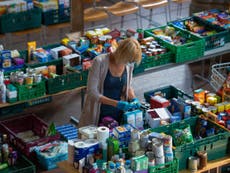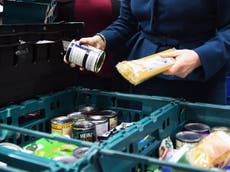Tens of thousands forced to turn to food banks for first time as demand soars during pandemic, figures show
‘New wave’ of families who have never needed help before struggling to make ends meet due to falling incomes and rising costs
Your support helps us to tell the story
From reproductive rights to climate change to Big Tech, The Independent is on the ground when the story is developing. Whether it's investigating the financials of Elon Musk's pro-Trump PAC or producing our latest documentary, 'The A Word', which shines a light on the American women fighting for reproductive rights, we know how important it is to parse out the facts from the messaging.
At such a critical moment in US history, we need reporters on the ground. Your donation allows us to keep sending journalists to speak to both sides of the story.
The Independent is trusted by Americans across the entire political spectrum. And unlike many other quality news outlets, we choose not to lock Americans out of our reporting and analysis with paywalls. We believe quality journalism should be available to everyone, paid for by those who can afford it.
Your support makes all the difference.Tens of thousands of people have been forced to rely on food banks for the first time in the wake of the coronavirus outbreak, according to new research which shows demand for food parcels is set to soar by 61 per cent this winter compared to the same period last year.
Analysis published by the Trussell Trust, the UK’s largest food bank provider, estimates that 846,000 food parcels will be distributed in October to December this year – with six given out every minute – as furlough comes to an end and unemployment is set to rocket.
The research, carried out on behalf of the charity by Heriot-Watt University, also shows that during the start of the pandemic, around half of people who used a food bank in the Trussell Trust network had never needed one before – and families with children were hardest hit.
The latest data shows that almost 100,000 households received support from a food bank in the Trussell Trust network for the first time between April and June this year.
It comes as separate findings published by Action for Children indicate that a “new wave” of families who have never needed help before are struggling to make ends meet due to falling incomes and rising household costs – with 71 per cent of households supported by the charity's emergency appeal having not had financial issues before the pandemic.
With the end of the furlough scheme in October set to see unemployment soar to levels not seen since the early 1990s, the charity warns that families will be plunged into even deeper crisis as thousands struggle to keep their children clothed and well-fed.
In one case, parents Leah Gale, 25, and Carl, 28, from Sherborne in Dorset, found themselves struggling to afford the basics for their three children – Jayden, six, Colby, four, and Evelyn, two – when work dried up for Carl, a self-employed painter and decorator, during lockdown.
The family were forced to turn to their local food bank for the first time, and they have also been supported by funds from Action for Children’s coronavirus appeal, which helped them pay for gas and electricity as well as buy summer clothes for their children.
“We were doing OK before the pandemic – just. But everything went downhill rapidly after lockdown,” Leah explained.
“As Carl is self-employed, we’re not entitled to any government help or furloughing or anything, so we’ve been forced to borrow left, right and centre from family and friends as well as take out a loan to cover the council tax.
“We’ve never struggled like this before, ever. Covering life’s basic expenses since March has pushed us into the most debt we’ve ever been in – and it doesn’t look like things will get better for a long while yet.”
Dee Woods, co-founder of Granville Community Kitchen, which provides both food parcels and cooked meals to local people in need in Brent, London, said there had been a 700 per cent rise in demand since the start of lockdown – with the service now supporting around 700 people per week, compared to 100 in March.
She said the rise was made up of a combination of people who had lost their jobs and weren’t offered furlough or had no recourse to public funds, those still in work but with reduced hours, those whose benefits don’t cover their needs and rough sleepers who were placed in hotels during lockdown but have now had to leave.
Explaining that many had never used a food bank before, she said: “People turn up and break down into tears. They never thought they would end up in a situation where they would need to ask for help to eat. Sometimes they’ve already gone without food for days. It really is heartbreaking.”
Ms Woods said she was concerned about the months ahead, adding: “We are preparing for a tsunami. Right now it feels calm, but there will be increasing unemployment when the furlough scheme ends and more people lose their jobs and have to go on benefits.”Sally Noden, who runs Action for Children’s Newcastle family support service, which has been working in partnership with the city’s West End food bank, said she and her team had supported many families who hadn’t needed help before – often single parents who had lost their income due to the pandemic.
“It’s been a real struggle for families that had been just about managing before and had never had to go to food banks to suddenly have to say, ‘I don’t have enough food.’ That’s a really big thing for a parent. It can really impact on their mental health and their self-esteem,” she said.
Ministers are being urged to put a “protective shield” around struggling families by not withdrawing the £20-a-week increase in universal credit, which was announced in response to the pandemic, and by boosting child benefit this winter, to prevent a generation of children from being “scarred by poverty”.
Jonathan Reynolds, Labour’s shadow work and pensions secretary, urged the government to take “further, urgent action” to make sure that no one goes hungry during the public health crisis.
“Months into this crisis too many people are still falling through the gaps in the safety net and children are going hungry as a result. The government’s incompetence is worsening already unacceptable levels of child poverty in the UK,” he said.
The Trussell Trust warned that, without action, 670,000 additional people are set to be classed as destitute by the end of 2020 – on top of year-on-year rises in the number of people unable to afford food and forced to use food banks across the UK.
Emma Revie, chief executive of the charity, warned that food banks and other community charities could not “continue to pick up the pieces”, adding: “Our research finds that Covid-19 has led to tens of thousands of new people needing to use a food bank for the first time. This is not right.
“With the furlough scheme set to wind down, we must act now to put in place protection for each other. The Budget and comprehensive spending review present a pivotal opportunity to put things right.”
Carol Iddon, deputy chief executive at Action for Children, said families were “hanging by a thread” as they faced one of the “bleakest winters of their lives".
“While parents on low incomes are starting to buckle, a new wave of families who’ve never needed help before are now also struggling to make ends meet," she added.
“The government must put a protective shield around struggling families by ensuring that November’s Budget makes clear that universal credit will not be cut by £20 a week in the spring.”
Andrew Forsey, director of Feeding Britain, said the new food bank figures were “incredibly troubling”, adding: “They show that something very serious has been happening to the poorest individuals in our society and this has been amplified by the pandemic."
Sabine Goodwin, coordinator of the Independent Food Aid Network, pointed out that on top of the 1,200 Trussell Trust food banks, there were at least 916 independent food banks distributing emergency food parcels every week – all of which had also seen a huge rise in demand.
“Decisive and immediate action needs to be taken to turn the tide of escalating poverty levels driving the proliferation of food banks, food pantries and other charitable food aid providers,” she said.
A government spokesperson said: “We have provided £9.3bn extra welfare support to help those most in need, including increasing universal credit by up to £20 a week, as well as introducing income protection schemes, mortgage holidays and additional support for renters.
“Meanwhile, since mid-March we’ve supported 3.9 million claims to universal credit and made 1.3 million advance payments to people who could not wait.”
The Independent’s Help The Hungry campaign is highlighting projects that need your help to feed people left vulnerable by the Covid-19 crisis



